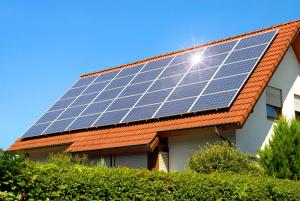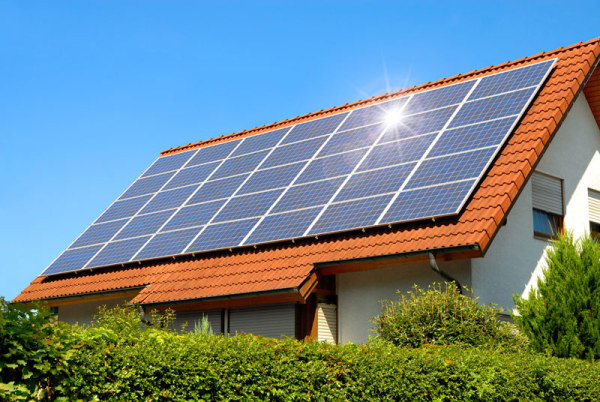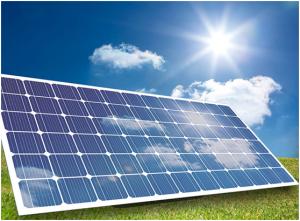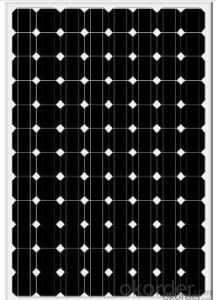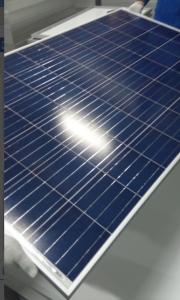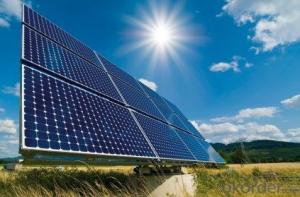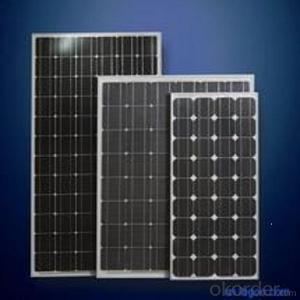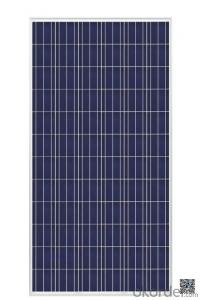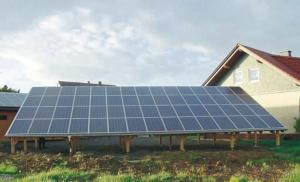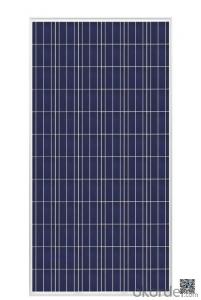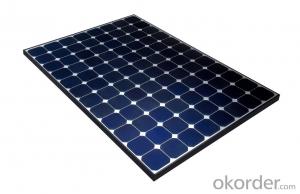Solar Module Poly - Solar Panels for Ac Units
- Loading Port:
- Tianjin
- Payment Terms:
- TT OR LC
- Min Order Qty:
- -
- Supply Capability:
- 300mw watt/month
OKorder Service Pledge
OKorder Financial Service
You Might Also Like
Solar Module
ABOUT YINGLI GREEN ENERGY
Yingli Green Energy Holding Company Limited (NYSE: YGE) is one of
the world’s largest fully vertically integrated PV manufacturers, which
markets its products under the brand “Yingli Solar“. With over 7.0GW
of modules installed globally, we are a leading solar energy company
built upon proven product reliability and sustainable performance. We
are the fi rst renewable energy company and the fi rst Chinese company
to sponsor the FIFA World CupTM.
PERFORMANCE
- High effi ciency, multicrystalline silicon solar cells with high transmission
and textured glass deliver a module effi ciency of up to 16.0%,
minimizing installation costs and maximizing the kWh output of your
system per unit area.
- Tight positive power tolerance of 0W to +5W ensures you receive
modules at or above nameplate power and contributes to minimizing
module mismatch losses leading to improved system yield.
- Top ranking in the “TÜV Rheinland Energy Yield Test” and the
“PHOTON Test” demonstrates high performance and annual energy
production.
RELIABILITY
- Tests by independent laboratories prove that Yingli Solar modules:
Fully conform to certifi cation and regulatory standards.
Withstand wind loads of up to 2.4kPa and snow loads of up to
5.4kPa, confi rming mechanical stability.
Successfully endure ammonia and salt-mist exposure at the highest
severity level, ensuring their performance in adverse conditions.
- Manufacturing facility certifi ed by TÜV Rheinland to ISO 9001:2008,
ISO 14001:2004 and BS OHSAS 18001:2007.
WARRANTIES
- 10-year limited product warranty1.
- Limited power warranty1: 10 years at 91.2% of the minimal rated power
output, 25 years at 80.7% of the minimal rated power output.
1In compliance with our Warranty Terms and Conditions.
QUALIFICATIONS & CERTIFICATES
IEC 61215, IEC 61730, MCS, CE, ISO 9001:2008, ISO 14001:2004, BS OHSAS
18001:2007, PV Cycle, SA 8000
ELECTRICAL PERFORMANCE
Electrical parameters at Standard Test Conditions (STC)
Module type YLxxxP-29b (xxx=Pmax)
Power output Pmax W 260 255 250 245 240
Power output tolerances ΔPmax W 0 / + 5
Module effi ciency ηm % 16.0 15.7 15.4 15.1 14.8
Voltage at Pmax Vmpp V 30.3 30.0 29.8 29.6 29.3
Current at Pmax Impp A 8.59 8.49 8.39 8.28 8.18
Open-circuit voltage Voc V 37.7 37.7 37.6 37.5 37.5
Short-circuit current Isc A 9.09 9.01 8.92 8.83 8.75
Electrical parameters at Nominal Operating Cell Temperature (NOCT)
Power output Pmax W 189.7 186.0 182.4 178.7 175.1
Voltage at Pmax Vmpp V 27.6 27.4 27.2 27.0 26.8
Current at Pmax Impp A 6.87 6.79 6.71 6.62 6.54
Open-circuit voltage Voc V 34.8 34.8 34.7 34.6 34.6
Short-circuit current Isc A 7.35 7.28 7.21 7.14 7.07
STC: 1000W/m2 irradiance, 25°C cell temperature, AM1.5g spectrum according to EN 60904-3.
Average relative effi ciency reduction of 3.3% at 200W/m2 according to EN 60904-1.
NOCT: open-circuit module operation temperature at 800W/m2 irradiance, 20°C ambient temperature, 1m/s wind speed.
OPERATING CONDITIONS
Max. system voltage 1000VDC
Max. series fuse rating 15A
Limiting reverse current 15A
Operating temperature range -40°C to 85°C
Max. static load, front (e.g., snow) 5400Pa
Max. static load, back (e.g., wind) 2400Pa
Max. hailstone impact (diameter / velocity) 25mm / 23m/s
CONSTRUCTION MATERIALS
Front cover (material / thickness) low-iron tempered glass / 3.2mm
Cell (quantity / material / dimensions /
number of busbars)
60 / multicrystalline silicon / 156mm x 156mm / 2 or 3
Encapsulant (material) ethylene vinyl acetate (EVA)
Frame (material / color / anodization color /
edge sealing) anodized aluminum alloy / silver / clear / silicone or tape
Junction box (protection degree) ≥ IP65
Cable (length / cross-sectional area) 1000mm / 4mm2
Plug connector
(type / protection degree) MC4 / IP67 or YT08-1 / IP67 or Amphenol H4 / IP68
PACKAGING SPECIFICATIONS
Number of modules per pallet 29
Number of pallets per 40' container 28
Packaging box dimensions
(L / W / H) 1700mm / 1135mm / 1165mm
Box weight 568kg
Unit: mm
• Due to continuous innovation, research and product improvement, the specifi cations in this product information sheet are subject to change
without prior notice. The specifi cations may deviate slightly and are not guaranteed.
• The data do not refer to a single module and they are not part of the offer, they only serve for comparison to different module types
- Q: i am wanting to build a small tiny house running 3-4 2 volt 5 watt light bulbs for a lighting source and using a Koolatron Fun Kool 26 Quart 2V Portable Mini Fridge This cooler consumes 4.5 amps at 2 volts. The conversion is: 4.5 amps (X) times 2 volts (=) equals 54 watts. and i want a solar system that will have back up for 2 days with the lights on for probly 5-6 hours a day so theirs no room for error
- you silly ! with Solar there is always room for error . you have to build it in to your numbers . solar is full of errors . So you should plan on producing at 3 times what you expect you will need . then you have enough .
- Q: Can solar panels be installed on historic homes or buildings?
- Yes, solar panels can be installed on historic homes or buildings. However, it is important to consider the specific regulations and guidelines in place for historic preservation in each jurisdiction. In some cases, there may be restrictions on the placement and design of solar panels to ensure they do not detract from the historical integrity of the property. It is advisable to consult with preservation authorities or experts to determine the feasibility and appropriate approach for solar panel installation on historic structures.
- Q: I have heard you can make your own solar panels.... But How?Where do you start? Is it cheap, or should I just BUY them already made?
- If you're thinking of solar electric panels then forget it. It you just want to dabble in solar power then shop around for a 5 volt panel. Find out how many watts it puts out and then divide the cost $$ by the wattage. The lower the cost per watt the better of a deal you'll be getting That's generally speaking of course because it doesn't take quality into account but it's a practical way to compare panels. On the other hand, it you want to make a solar panel that will heat hot water then it's a different story. You can have a lot of fun with that project and you'll find a lot of plans on the Internet.
- Q: How do solar panels affect satellite dish reception?
- Solar panels can potentially interfere with satellite dish reception, as they may obstruct the line of sight between the dish and the satellite. This obstruction can cause signal loss or degradation, leading to a reduction in the quality of reception. However, proper installation and positioning of the solar panels can help minimize this impact and ensure optimal satellite dish reception.
- Q: Can solar panels be installed on a flat roof?
- Yes, solar panels can be installed on a flat roof. However, it is important to consider the orientation, tilt, and shading of the roof to ensure maximum efficiency and productivity of the solar panels.
- Q: I made three 36 solar cell (3x6 .5V 3.5A) panel and had it hooked a up to an old car inverter. I was on line looking for a cheap grid tied inverter. I came across the Enphase micro inverter and was wondering if i could use one of those. Will it work?
- It won't work for several reasons. ) Enphase needs 24V modules, you made 8V ones. The voltage is too low to turn it on. 2) Only UL listed (or similar lab) panels are allowed to be connected to your house electrical system. Even if you did get them to work with the Enphase, you won't be able to get the system inspected, there is no way it would be allowed to be turned on by the electrical inspector nor the electric company. 3) If you got by obstacles and 2, and you had an electrical fire in your house, it is highly likely your insurance company would not pay you for it, as you used non-UL panels. DIY panels are fine for little back yard projects, but when it comes to your home, buy real ones. The price has dropped so much in the last 2 years, it's not worth it to mess around.
- Q: Okay, I think I understand what I'm doing, but I want to set up some solar panels on the roof of my garage, the building that gets the most sun, and I want to make sure all my math is correct in determining number of megawatts per year. However, my knowledge of electrical terms in quite n00bish, to say the least.Here is what I think I should be doing.The solar cells come at .75 Watts average power.I will install 4 panels of 64 cells each, with a total of 256 cells.
- For comparison, 36 of these make a normal 2V x 50W panel. Note they are not tabbed. This means you have to find a way to connect them yourself. The tabs are probably spot welded on by the suppliers. A supplier below has kits of these with tabs, as needed to connect them together. These are not suitable for grid connect, because the higher voltage needed makes do it yourself panels a dangerous and litigious thing to have on your roof. Maybe you could buy a smaller pack from the link below to compare tabbed and untabbed and work out what to do. Your power calculation is a bit incorrect because the sun is only present some of the time. The 36 cell module would produce 50W when square on to the full sun. The sun may be out for around 2h a day in some places and times of the year. However it is the equivalent of 5h full sun, because of the changing angle throughout the day. Look this up on the internet for your region. Temperate zones may be a lot less. One pack in your link is 36x3 = 08 cells. Thus 50W per pack x 5h a day gives 750Wh per day and 274KWh/y. In reality it will always be less because of regions, weather, clouds, dust, inefficiencies, aging of cells.
- Q: Have a 20V 40W solar panel and it is attach to two backup batteries. Just want to know know how many watt of inverter do I need?
- It depends on what you want to run from the panel. A 20W inverter might last a long time, but would not run much. A 00W inverter might run down your batteries in a few hours. It might help if you posted how much capacity (Volts, Amp-Hours) the batteries have.
- Q: want to run 400 watt heater 8 hrs a day how many solar panels do i need and batteries
- well, you need to produce 3200 watt-hours per day with your solar panels how many you need depends on the type of panel and size and how much sun you get (the energy of the rays depends on your latitude and the time of year) the amount of batteries you need again depends on your requirements and your insolation if you only need to heat when the sun is shining then you don't need any batteries at all if you want to heat for 8 hours after the sun has quit shining then you obviously need batteries to hold 3200 watt-hrs of electricity to actually size a 3200+ watt-hr solar system you need a lot more information
- Q: how to market solar energy products?
- It depends upon your product. If it is a solar panel, I want to know if it is a photovoltaic panel or a thermal panel. If you don't know enough to know the difference for your question it might be somewhat difficult to suggest others should buy them. Products have to be marketed to a need either already felt or not so apparent. Photovoltaic panels supply an electric need and will offset electrical usage or may supply the grid if there is excess power. A discussion of payback periods including property values will be needed in any event. Thermal panels supply heat and hot water. They are more efficient than photovoltaic panels and will give faster payback times. (are cheaper) If you are a bit more specific more information may be possible.
Send your message to us
Solar Module Poly - Solar Panels for Ac Units
- Loading Port:
- Tianjin
- Payment Terms:
- TT OR LC
- Min Order Qty:
- -
- Supply Capability:
- 300mw watt/month
OKorder Service Pledge
OKorder Financial Service
Similar products
Hot products
Hot Searches
Related keywords
